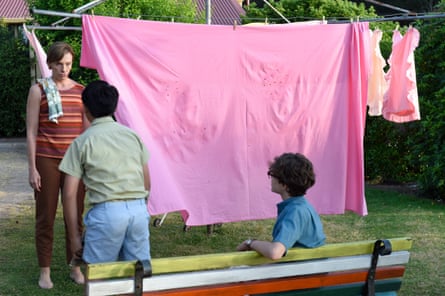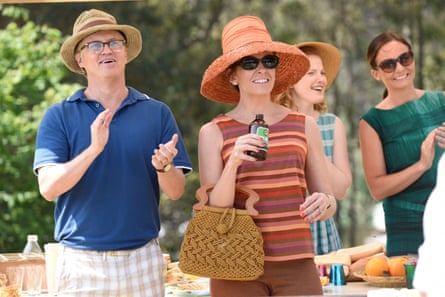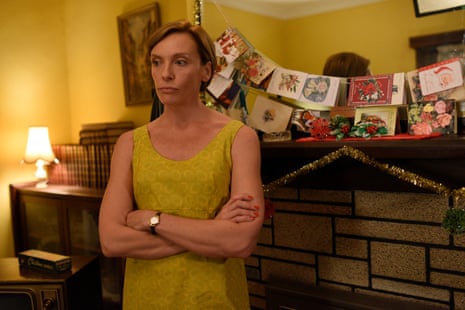Toni Collette says her latest character is having a “classic midlife crisis”. It’s an experience that must seem a world away for the western Sydney-born actor, contentedly married with two children and never out of work, even as she longs for more roles on home soil.
On the Western Australian set of the feature film Jasper Jones, Collette says she misses “the space, the light, family, friends, fresh air – all the basics”.
She is pleased to be here. The actor was so keen on Jasper Jones – the story of a bookish boy who becomes embroiled in the mysterious death of a local girl, based on the award-winning novel by Craig Silvey – that she wanted to option the rights to the film herself. “Everybody did,” she says, laughing. She was beaten out by producers Vincent Sheehan and David Jowsey – but landed a performing role instead.
Now her hair is short and brunette, and she has a coat temporarily wrapped around the elegant sleeveless white dress she is wearing for tonight’s scene. We are standing in a carpark between takes in the timber sawmill town of Pemberton, 327km south of Perth, in a region famed for the majestic karri eucalypts that grow in the surrounding state forests. It’s a chilly 12C and there’s a bright half moon.
On the page of Silvey’s novel, set in the 1960s, Collette’s character, Ruth Bucktin, comes across as full of rage, feeling unloved in her marriage in a country town while social change hurtles along without her, until she tears apart her relationships with husband, Wes (her Muriel’s Wedding co-star Dan Wyllie), and 13-year-old son, Charlie (Levi Miller), by acting out her demons.
Collette is trying to bring more nuance and empathy to her character, who could otherwise, she says, be seen as a “restrictive mean bitch”. “I’m trying to colour her with a lot more,” she tells Guardian Australia. “I think she’s so sad and probably scared by the things she’s starting to reject and the yearnings she has.”
We step aside as a crane is rushed through with a camera atop to swoop an aerial view of New Year’s Eve celebrations beside the fictitious Corrigan town hall, festooned with flags, firework catherine wheels, trestles of jam preserves and swivelling ping-pong clown heads.

Silvey’s story has been shifted from 1965 to 1969–70 for the film, to ratchet up the tensions of social change, particularly around the home roles and career lives of women, the Vietnam war, and prejudices regarding Indigenous Australians and migrant populations.
The film is directed by Rachel Perkins (Bran Nue Day, Radiance), whom Collette says has been “incredible” to work with: “We’re in the middle of nowhere, there’s no budget to speak of, which you wouldn’t know looking at this beautiful set, and it’s a very relaxed, low-key, pacy, emotionally accurate, deftly run set. And it’s fun.”
Collette tells Guardian Australia she would like to direct a feature film herself at some point. “It’s timing, and you’ve got to find the right story. You’ve got to be able to resonate with it. But, yep, definitely.”
She was drawn to the universality of the Jasper Jones narrative – a coming-of-age story and murder mystery at the same time – which also happens to be Australia-specific: cricket is king and the titular character of Jasper (Aaron McGrath) is outcast from the town because he is Aboriginal.
Whether Collette will herself direct an Australian story in the future remains to be seen; the question of continuing to work in Australia elicits a deep longing. For Collette, working in an Australian idiom and telling Australian stories remains crucial.
“I would love to work here more, but it’s kind of impossible,” she laughs. “There’s not enough to do, and don’t you think if I was in everything, people would be like, ‘Fuck off’?
“I’ve had this incredibly fortunate life where I’ve been able to work in many different countries with lots of really talented, inspirational people.
“But, yeah, I’m from here, my kids are Australian, this is home. It’s very important for me to work here, even if it’s every four or five years. I’ve always got my eye out for something.
“I also think the world is changing. Everything is globalised. You embrace that, but at the same time … I have these memories of an Australia that my kids will never know. It was so beautiful and so seemingly innocent and part of this is what it looks like in my mind,” she says, and motions to the decorated timber hall and trees.
“So when they’re a bit older they can watch movies like this and get a glimpse of what their parents and grandparents might have been a part of.”
I mention that the funding body Screen NSW has announced a 50-50 gender equity target by 2020 to combat low levels of female representation in directorial roles in Australian-funded films.
“Why’s it going to take that long?” she says. “There’s a huge imbalance. I wised up to that several years ago. It’s important for me to work with and support other women.”
Her recent parts in Australia include star roles in the 2012 film Mental, with her Muriel’s Wedding director PJ Hogan, and the 2014 Showcase miniseries Devil’s Playground. She has also been cast in the Australian director Fred Schepisi’s upcoming romantic thriller, Andorra, to be shot this year in Italy.

What of her erstwhile singing career, which has gone quiet since she released an album of self-penned tracks, Beautiful Awkward Pictures, in 2006?
Recently, away from family and on location in the US making the film Imperium, she said: “I woke up one morning and wrote a song. You just need space to digest life and allow something to come, you know?”
Collette’s global impact partly stems from her starring role in three seasons of the US comedy-drama United States of Tara, about a woman with dissociative identity disorder. The impact of this show was more widespread than Collette expected. She talks of sitting in Covent Garden, waiting for friends to get coffee (she likes the smell of coffee but not the taste) when a woman approached her:
“I could tell this woman was looking at me. She had a strange vibe. She came up and said, ‘Oh, look I just wanted to say I really liked United States of Tara. I have DID, and I want to tell you it really helped me.’ She scuttled off. For someone to have it, and say that the show helped them, that was intense.”
But perhaps the crucial element is the fact that Collette seems infinitely relatable. Her co-stars agree: Wyllie, who played her brother in Muriel’s Wedding more than 20 years ago, for instance, says she’s a “very emotional person” and he links her “unique and affecting” performances to her background in western Sydney’s working-class suburb of Blacktown. Matt Nable, working with Collette for the first time, describes her as “a very grounded woman … an everyday kind of person.”
What does Collette herself think? “I’m not particularly cagey, you know?” She gives her toothy laugh.
“I act because I like people, I like to understand people, and discover different perspectives on how to exist. We’re all in this together. I think a lot of people forget that, you know?”

Comments (…)
Sign in or create your Guardian account to join the discussion